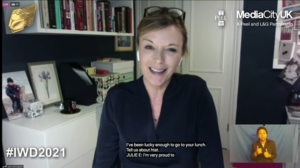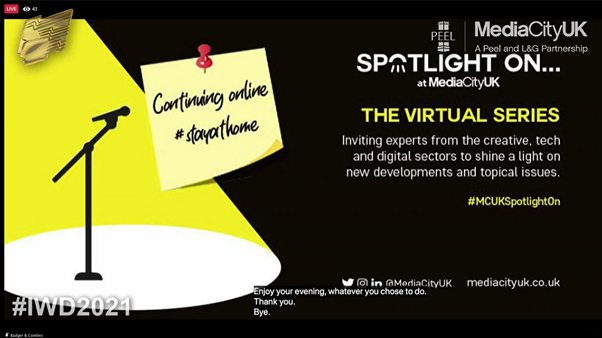On Monday 8 March, to mark International Women’s Day, MediaCityUK hosted a virtual panel event with Louise Minchin, Julie Hesmondhalgh, Melissa Johns, Shelley King, Julie Etchingham, Ayshah Tull, and Anna Richardson to celebrate diversity and inclusion in the media industry.
Highlighted in the discussion was the effect of social media on women’s mental health, the need for racial diversity, and routes into the television industry. In the hour long panel, the women, ranging from journalists to actresses, bonded over a shared love for the industry and addressed what still needed to be achieved to have gender equality in society.
MediaCityUK is stacked full of talented, innovative and creative women and the clip below is just a snapshot.
On Monday 8th March, join us as we celebrate #IWD2021 with an all star female panel for @MediaCityUK's Spotlight ON… International Women's Dayhttps://t.co/2kARf6UdTX pic.twitter.com/ppyZNOTJE9
— MediaCityUK (@MediaCityUK) March 2, 2021
Julie Etchingham
Broadcaster and presenter, Julie Etchingham, started her career as a BBC trainee with one of her first jobs at Newsround before later progressing to Sky News and then ITV News where she has been a newscaster since 2008.
“the focus should be on which women are getting access rather than whether women are getting access”
Etchingham described the environment of entering the industry thirty years ago as “pretty male dominated” but also added that much has changed since then. “There’s lots of challenges ahead but we’ve come a long way”.
She said that now the focus should be on which women are getting access rather than whether women are getting access, without the importance of opening doors crucial going forward.
The news presenter is also President of the Women of the Year Lunch and Awards – a yearly celebration of women who play a vital role in contributing to a civic society. Her aim is to lift up those women who achieve less recognition and praise their important work.

Shelley King
Actress Shelley King stars in Coronation Street as Yasmeen Nazir. Her coercive control storyline, with manipulative and abusive husband Geoff Metcalfe (played by Ian Bartholomew), urged hundreds of vulnerable women to come forward who were facing a similar situation.
King also praised the storyline for bringing women together irrespective of ethnicity as they were all united in their tackling of domestic abuse. King said how “people are recognising the truth of this horror…this is a triumph.”
“she is glad that her acting was able to place an important spotlight on these issues”
She is also a patron of Hope Foundation UK, a Kolkata based charity in India which aims to support vulnerable women by providing life skills training and building homes for those in need.
Whilst King recognised that there was still a long way to go in order to achieve diversity, she is glad that her acting was able to place an important spotlight on these issues.
Ayshah Tull
Journalist Ayshah Tull started as a reporter for BBC Newsround before eventually becoming a Channel 4 News correspondent.
“she does still recognise, however, that diversity still severely lags behind”
Throughout her career, Tull has received harsh online criticism related to her race, weight, and size, with some older viewers suggesting that she wasn’t a good role model for young children. In order to push through the criticism and setbacks, Tull has been inspired by a number of women in the industry including ITV’s Charlene White and Sky News’ Gillian Joseph.
She does still recognise, however, that diversity still severely lags behind. To protect her mental health, she will at times switch off from social media when she senses that the environment could become toxic. Despite this, she still remains optimistic, recognising that women have come a long way from when she first started in the industry.
Anna Richardson
Journalist and presenter, Anna Richardson, started her career on Channel 4’s Big Breakfast before eventually starting her presenting role on Naked Attraction in 2016.
“she highlighted that one of the key traits in the TV industry was to be really nosey”
When the show first launched, she was hit was an enormous amount of online abuse with viewers criticising the nature of the programme. This soon changed into a celebration of acceptance for its diversity however, and it became the most downloaded show on Channel 4.
She highlighted that one of the key traits in the TV industry was to be really nosey and this helped her stand out from the crowd.
Richardson did, however, convey her frustration at the lack of progress towards gender equality as the #MeToo movement reflected similar experiences she’d faced ten years ago. “It feels like we’re no further forward”, she expressed.
Julie Hesmondhalgh
Actress Julie Hesmondhalgh, most famous for her time on the cobbles as Hayley Cropper in Coronation Street, reflected on the deeply internalised misogyny she felt when taking up her role as a rape victim in ITV’s Broadchurch.
She conveyed how her previous mentality used to be, “will people buy me as a rape victim? I’m not the traditional rape victim.”
“Hesmondhalgh emphasised the need to have a global perspective on the issue”
Despite this internal critique, Hesmondhalgh valued the important discussion her role as rape victim brought up as it highlighted how abuse can happen to women from any background. She also described how this linked to broader inequities for women, with job prospects and pay continuing to be a huge barrier for many.
In order to combat this deep rooted discrimination, Hesmondhalgh emphasised the need to have a global perspective on the issue, seeking to change things from the bottom up so that an investment drives can equal rights and inclusion for all.
Melissa Johns
Actress Melissa Johns, best known for her time on Coronation Street, noted the pressures of body image for women as she recounted how she had previously felt ashamed of her body growing up as it felt so different to those around her.
Whilst this critique of her self image caused her to lose her own self-confidence, she believes that television helped her overcome this. Praising the medium and power of television, she said that “TV will always have one of the biggest responsibilities because it can be a gamechanger”. It is this visual dynamic of television which she believes is crucial to driving social change as it speaks to everyone, irrespective of background.
Louise Minchin
“whilst she recognises that breaking into the industry can have its setbacks, it’s also a career that she is greatly passionate about”
Journalist and host for the evening, Louise Minchin, started her career in the industry at BBC Radio 5 Live, first joining BBC Breakfast in 2007 before becoming one of the main presenters in 2012.
Her passion for the media industry was evident from a young age, with her university dissertation focusing on the portrayal of women in the media and how this perception was damaging for their progression going forward.
Whilst she recognises that breaking into the industry can have its setbacks, it’s also a career that she is greatly passionate about and she feels positive about the increasing diversity of women in the workplace.
At the end of the session, all panelists were asked to suggest three women they would like to go on a lunch date with. Guests included a range of inspirational women such as Michelle Obama, Oprah Winfrey, Julie Walters, and Kate Mosse.
For those who missed the event, it can be watched back here. Details of other Media City UK events are posted on their website here.
Lauren McGaun
Images courtesy of Lauren McGaun. No changes were made to these images.

